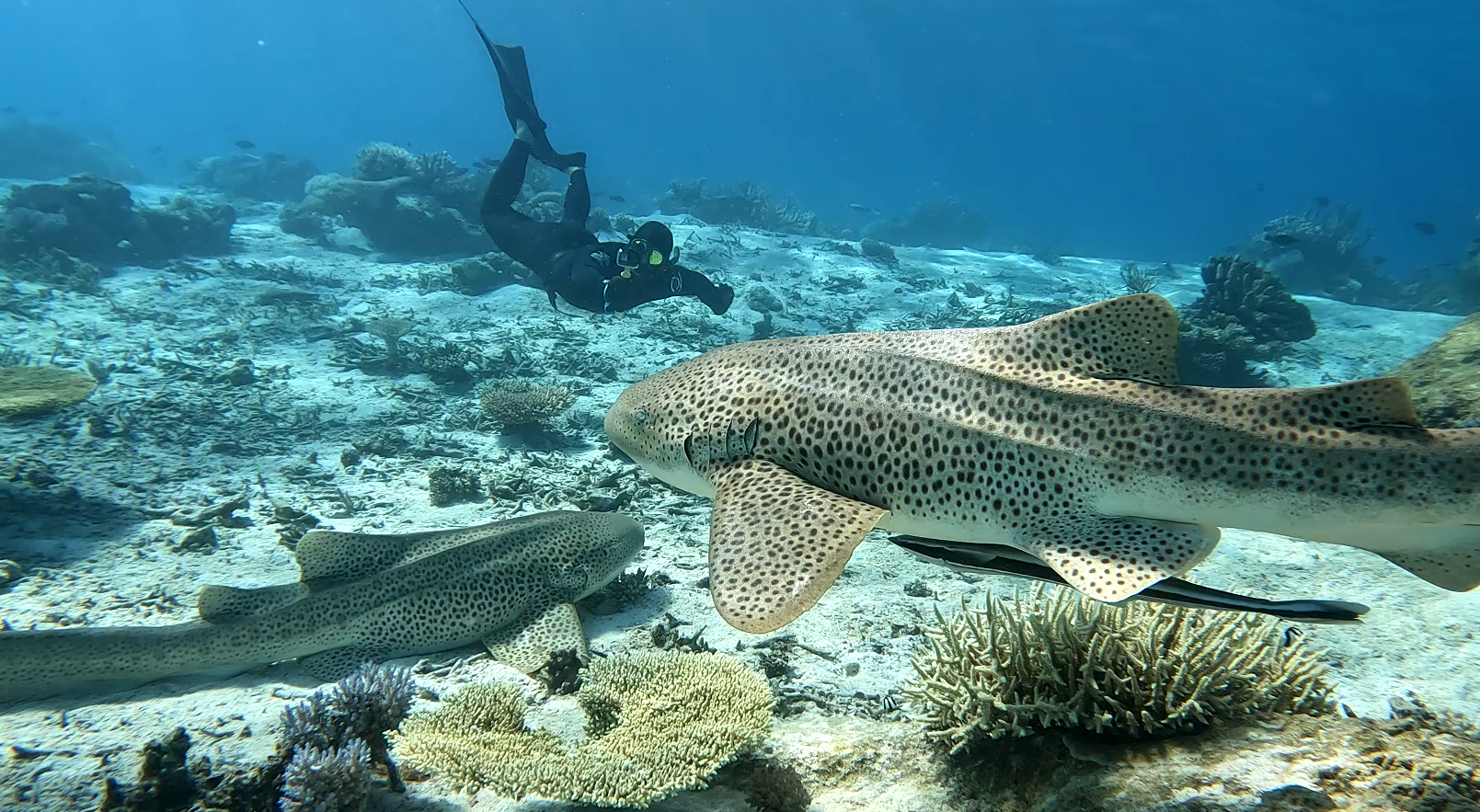How New Caledonia’s zebra sharks inspired the StAR Project: Q&A with Dr. Hugo Lassauce
Dr. Hugo Lassauce is currently a postdoctoral researcher at Aquarium des Lagons Nouvelle Caledonie, one of our partner aquariums. He spearheads the Zebra Shark Project New Caledonia, a local initiative founded by his colleague and laboratory manager Dr. Olivier Château. The aquarium’s work on Stegostoma tigrinum has inspired and will continue to inform the StAR Project. We caught up with Hugo to find out more about the inception of the project and his postdoctoral work in New Caledonia.
Swimming with leopard sharks in New Caledonia / Photo by Hugo Lassauce
How did Aquarium des Lagons’ initial work with the local zebra shark population help formalize the thinking behind the StAR Project?
The origin story is pretty interesting. Way back in 2017, Dr. Mark Erdmann (Vice President of Asia-Pacific Marine Programs, Conservation International) started floating the idea of an ex situ shark conservation initiative with Indo-Pacific leopard shark researcher Dr. Christine Dudgeon (Senior Research Fellow, University of the Sunshine Coast). At the time, Aquarium des Lagons had already been working with citizen scientists to collect zebra shark eggs from the wild which we hatch and rear for our public display.
We have a lot of locals swimming in Lemon Bay, which is just next to our aquarium. They began showing interest in the bay’s biodiversity and started taking photos of what they saw and sending them to us. These photos included consistent sightings of zebra shark eggs.
Our team saw this as an amazing opportunity to not only include the species in our aquarium but to properly study it. We devised a protocol to conduct yearly surveys in the bay, collect the eggs we found, grow the pups in our aquarium and subsequently release the sharks once they had matured - it was basically StAR before StAR, but all happening right here in Noumea!
We tend to collect around 30 eggs each year between October and December. We suspect the laying of eggs tends to correspond with the warmer season. Slightly less than half of those eggs will be viable and eventually hatch.
Zebra shark eggs spotted by citizen scientists / Photo by Aline Guemas
How have the releases been like and what’s the potential for post-release monitoring?
We recently deployed a large number of receivers in the lagoon here in Noumea, which cover a wide array of marine habitats - from the coastline right out to the deep channels, comprising coral reefs, mangroves and seagrass meadows.
In a way, we’re casting our net as wide as possible as we really have no idea what kinds of habitats zebra shark juveniles tend to spend time in.
Since 2019, we’ve been tagging our sharks. Just recently, we successfully released our largest cohort of 8 zebra sharks - all tagged, and ready to go.
We released them in Lemon Bay itself, the same area their eggs came from. With the receivers in place, we’re looking forward to learning about the species’ life history, social behaviors, movement patterns and much more!
Recent release of zebra sharks in Lemon Bay / Photo by Bluegreen Production
That’s exciting! What else will you be up to in the coming years?
Apart from the catch-and-release program, I’m hoping to find out as much as possible about zebra sharks over the next three years.
My work will span everything, from engaging citizen scientists to monitor local populations through photo-ID to collecting biopsy samples. We hope to gain baseline data and knowledge about the species, which is only possible because of our local undisturbed marine environment.
Ultimately, we’re hoping that all these can go on to support the development of the StAR Project in Raja Ampat and beyond, as well as inform wider conservation measures.
Hugo and his colleague Hugues Gossuin releasing the newly-tagged zebra sharks in Lemon Bay / Photo by Bluegreen Production





